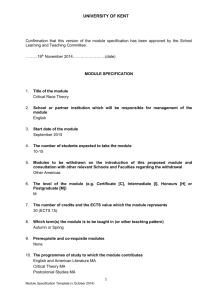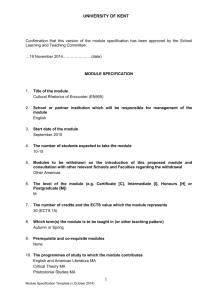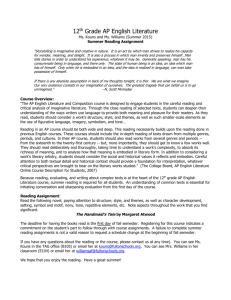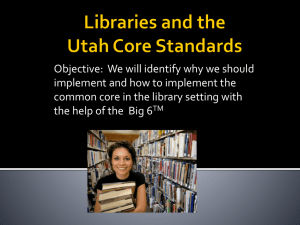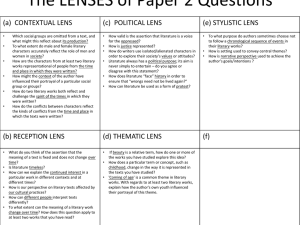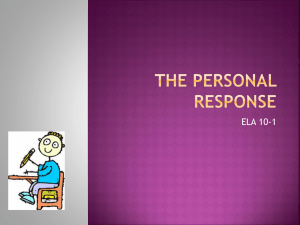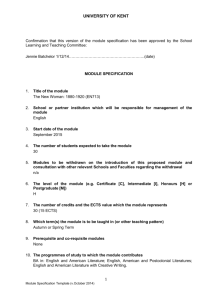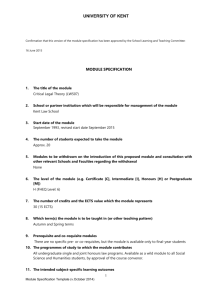University of Kent
advertisement
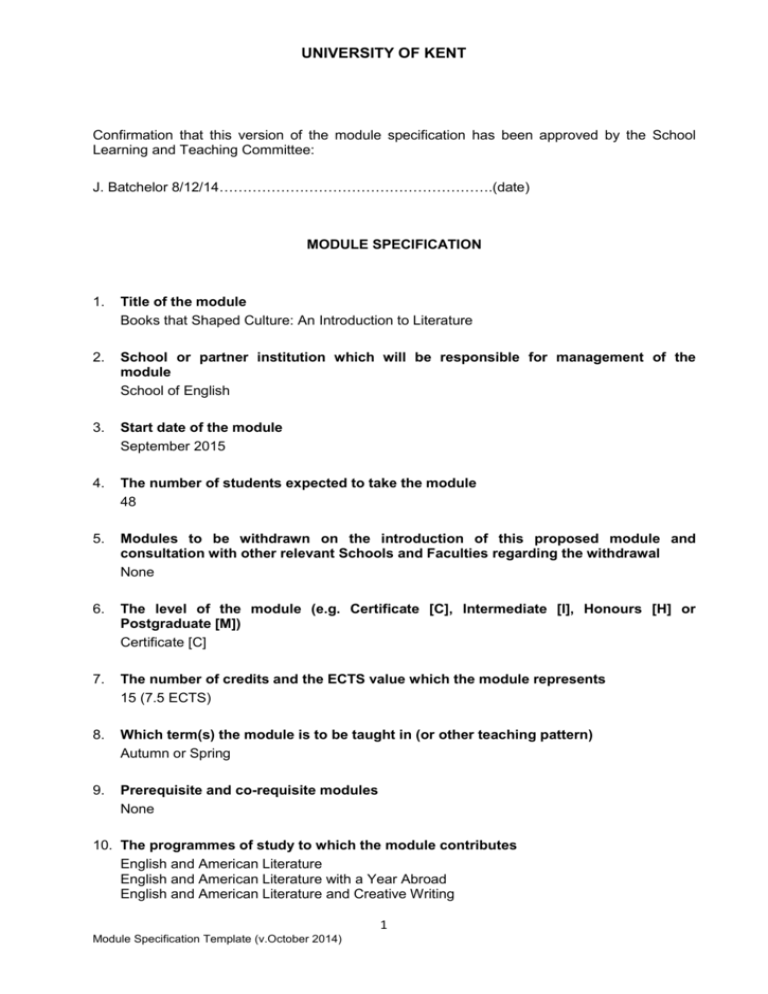
UNIVERSITY OF KENT Confirmation that this version of the module specification has been approved by the School Learning and Teaching Committee: J. Batchelor 8/12/14………………………………………………….(date) MODULE SPECIFICATION 1. Title of the module Books that Shaped Culture: An Introduction to Literature 2. School or partner institution which will be responsible for management of the module School of English 3. Start date of the module September 2015 4. The number of students expected to take the module 48 5. Modules to be withdrawn on the introduction of this proposed module and consultation with other relevant Schools and Faculties regarding the withdrawal None 6. The level of the module (e.g. Certificate [C], Intermediate [I], Honours [H] or Postgraduate [M]) Certificate [C] 7. The number of credits and the ECTS value which the module represents 15 (7.5 ECTS) 8. Which term(s) the module is to be taught in (or other teaching pattern) Autumn or Spring 9. Prerequisite and co-requisite modules None 10. The programmes of study to which the module contributes English and American Literature English and American Literature with a Year Abroad English and American Literature and Creative Writing 1 Module Specification Template (v.October 2014) UNIVERSITY OF KENT English and American Literature and Creative Writing with a Year Abroad English and American and Postcolonial Literatures English and American and Postcolonial Literatures with a Year Abroad 11. The intended subject specific learning outcomes On successful completion of this module students will have: 11.1 11.2 11.3 11.4 11.5 read and responded to a wide range of literary texts developed close reading skills appropriate to specific textual modes developed a knowledge and understanding of the ways in which literary texts speak, respond and contribute to their immediate social, religious, political and cultural contexts acquired a broad understanding of the ways in which literary canon formation can convey ideological purpose developed an awareness of the origins of English Literature as an academic discipline 12. The intended generic learning outcomes On successful completion of this module students will have developed: 12.1 12.2 12.3 12.4 12.5 12.6 a command of written and spoken English and the ability to articulate coherent critical arguments the ability to situate critical arguments in historical contexts the ability to employ secondary sources in a way that usefully illuminates primary literary texts and their contexts skills in the close reading and analysis of texts the ability to carry out independent research presentational skills 13. A synopsis of the curriculum The module introduces students to a number of important literary texts in English, spanning a broad chronological range from the Anglo-Saxon period to the present. It serves as a transition from A-level to degree-level study, encouraging students to develop a sense of the ways in which literary production has changed across time, and sharpening their critical capacity to analyse connections between textual materials and different areas of cultural production. Engagement with primary materials is central to the module; students will read shorter works in their entirety, while extracts from longer works will be studied. The module also invites students to consider questions including: how might a literary ‘classic’ be defined? Who decides what constitutes a canonical work? How, and under what conditions, might canonical texts cross over into popular cultural discourses? How and why was English Literature developed as an academic subject? 14. Indicative Reading List Primary texts ACHEBE, C. (2009) Things Fall Apart. New York: W. W. Norton & Co. HEANEY, S. (trans.) (1999) Beowulf. London: Faber. CONRAD, J. (1995) Heart of Darkness. Harmondsworth: Penguin. GASKELL, E. (1980) Cranford. World’s Classics. Oxford: OUP. MILTON, J. (1993) Paradise Lost. Cambridge: CUP. 2 Module Specification Template (v.October 2014) UNIVERSITY OF KENT WOOLF, V. (2008). A Room of One’s Own. Oxford. OUP Secondary texts BLOOM, H. (1995) The Western Canon: the books and school of the ages. London: Macmillan. COLLINI, S. (2008) Common Reading: Critics, Historians, Publics. Oxford: OUP. KERMODE, F. (1975) The Classic. London: Faber & Faber. KERMODE, F. (2004) Pleasure and Change: the Aesthetics of Canon. Oxford: OUP. LEAVIS, F. R. (1962) The Great Tradition. Harmondsworth: Penguin. PALMER, D. J. (1965) The Rise of English Studies. London: OUP. ROSS, T. T. (1998) The Making of the English Literary Canon. Montreal: McGill University Press. 15. Learning and Teaching Methods, including the nature and number of contact hours and the total study hours which will be expected of students, and how these relate to achievement of the intended module learning outcomes The module will be taught through weekly one-hour lectures and two-hour seminars. Seminars will consist of: general group discussion about set texts and topics (subject specific outcomes 11.1-5; generic outcomes 12.1-3); close reading tasks (subject-specific outcomes 11.2; generic outcomes 12.4); small group and presentation work (subject-specific outcomes 11.5; generic outcomes 12.1-4, 12.6); research tasks (subject-specific outcomes 11.3-5, generic outcomes 12.5) Seminar leaders will be available for student consultations in office hours throughout the year. Independent learning hours expected: 120. Total number of study hours: 150. 16. Assessment methods and how these relate to testing achievement of the intended module learning outcomes The assessments for this module are: 2 short essays, one of which will be a close reading exercise (800 words each) (20% each) – learning outcomes 11.1-3; 12.1-4 Research essay (2000 words) (50%) – learning outcomes 11.1-5; 12.1-5 Seminar performance (10%) – learning outcomes 11.1-5; 12.1-4 and 12.6 17. Implications for learning resources, including staff, library, IT and space Most of the books required for this module are already available in the library. Some additional titles, and further copies of some primary texts, may be required. 18. The School recognises and has embedded the expectations of current disability equality legislation, and supports students with a declared disability or special educational need in its teaching. Within this module we will make reasonable adjustments wherever necessary, including additional or substitute materials, teaching modes or assessment methods for students who have declared and discussed their learning support needs. Arrangements for students with declared disabilities will be made on an individual basis, in consultation with the University’s 3 Module Specification Template (v.October 2014) UNIVERSITY OF KENT disability/dyslexia support service, and specialist support will be provided where needed. 19. Campus(es) or Centre(s) where module will be delivered: Canterbury. 4 Module Specification Template (v.October 2014)
